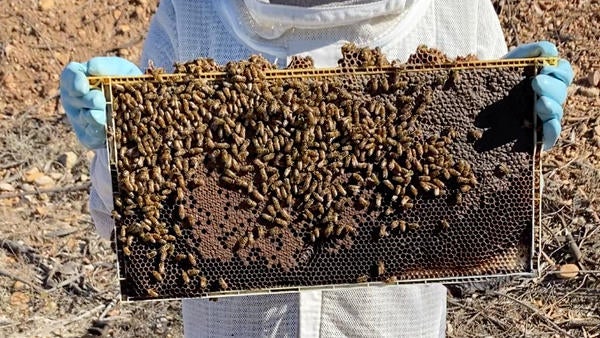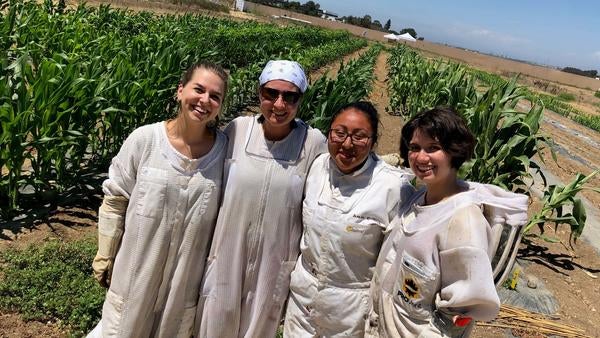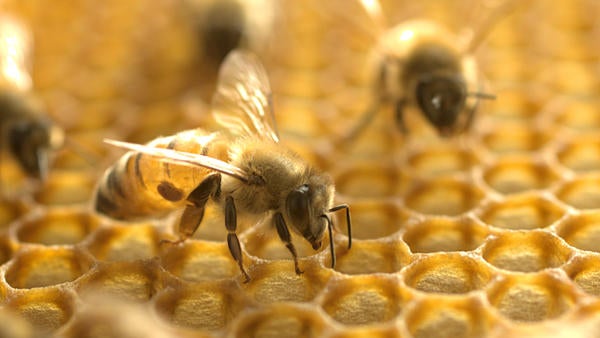
Scientists at four University of California campuses, including UC San Diego, are leading a new effort to stop and reverse a worldwide decline in honeybees, which threatens food security and prices.
Honeybees pollinate more than 80 agricultural crops, which account for about a third of what we eat. Several factors, including pesticide exposure and the spread of parasites and environmental changes, are to blame for the widespread collapse of bee colonies over the past decade.
To boost dwindling honeybee populations, the University of California’s Office of the President has awarded $900,000 to a four-campus network of bee researchers and engineers.
“This will become one of the largest honeybee health networks in the country,” said Boris Baer, a professor of entomology at UC Riverside and principal investigator of the project. “I’m very excited about so many different kinds of bee expertise joining forces through this project.”

At UC San Diego, James Nieh, a Division of Biological Sciences professor in the Section of Ecology, Behavior, and Evolution, and his students will be testing how nutritional supplements may help bees that have been exposed to pesticides and on how to harness the natural honey bee microbiome against a very common bee gut disease.
“We want to use what evolution has already given us to deal with bee disease because this should be a more natural and sustainable approach,” said Nieh. “Researchers have also focused a great deal on the harms caused by pesticides and this has helped improve some aspects of regulation. But we need to develop treatments for bees that are exposed to these chemicals because we will not realistically be able to eliminate all pesticide use.”
Research in Professor Joshua Kohn’s lab at UC San Diego is aimed at understanding the complex genomes of feral honey bees in Southern California. These bees have genomes that are a complex mixture of genomes of honey bee varieties from Africa, Europe and the Middle East. They are highly genetically diverse and ecologically successful. Their genomes likely hold variation useful to breeding domesticated honey bees with increased levels of resistance to the common diseases that currently plague the honey bee industry.
“This network of bee researchers comprises a unique mixture of expertise that can apply highly multidisciplinary approaches to benefit the honey bee industry essential to the production of many of California’s most economically important crops,” said Kohn.
The network, which includes researchers from the Davis and Merced campuses, is approaching the problem in three main ways.

The first is through breeding programs—a particular focus of Baer’s laboratory. “We seek to identify and breed bees that are better able to cope with environmental stress,” he said.
A second goal of the new network is to develop medications and treatments for sick bees. Certain types of honeybees generate molecules that make them more tolerant of pesticides and parasites. New technology will enable the scientists to isolate those molecules and use them as a basis for drugs.
Finally, the group is looking to give beekeepers tools to better monitor bees’ health. Small devices will be able to “listen” and “smell” inside hives to give beekeepers indications about the health of the hive.
“We know bee queens have a special pheromone they give off when they’re hungry or dying, and these can be traced,” Baer said. “We are essentially building ‘electronic veterinarians.’”
Preventative devices like these are key to keeping bees alive, because once the colony collapses, it’s too late to bring it back, Baer said.
The network’s goals closely mirror those of UC Riverside’s Center for Integrative Bee Research, or CIBER, which is also attempting to address the ‘pollinator crisis.’
Both groups are working closely with local beekeepers and getting feedback on whether the tools being developed are working for them.
“Together, we’ll develop innovative tools needed to effectively combat declining honeybee health, keep our food affordable and safeguard the livelihood of those working with bees,” Baer said.
Funding will also help provide research opportunities for undergraduates, including underrepresented students, with the goal of ensuring that the pipeline of students who enter research, academia, industry and multiple other professions reflects the diversity of the communities in which they learn and work.